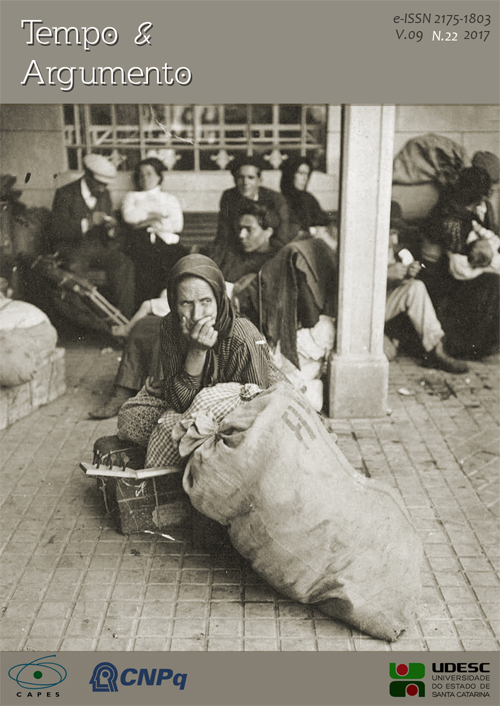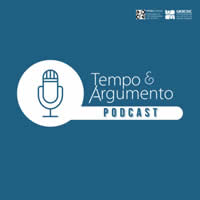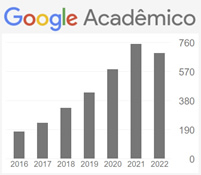Narrativas nacionais e competência histórica na formação inicial de professores primários espanhóis
DOI:
https://doi.org/10.5965/2175180309222017174Resumo
Neste trabalho, foram analisadas as competências de pensamento histórico e a presença de características de narrativa nacional entre 283 estudantes espanhóis do Grau de Licenciatura em Ensino Primário de Murcia e de Valência. Examinaram-se os seus relatos históricos sobre a expansão cristã na Península Ibérica em território muçulmano durante a Idade Média. Utilizaram-se métodos qualitativos para identificar os níveis de complexidade da exposição a partir de conhecimentos substantivos e conceitos metodológicos, e uma avaliação quantitativa para relacionar esses níveis de complexidade com os níveis cognitivos e narrativos, através da taxonomia SOLO. Também se avaliou em que medida se representam elementos discursivos próprios de uma narrativa nacional. Os resultados confirmam uma educação histórica deficiente dos futuros professores primários, tanto em conceitos históricos de segunda ordem quanto na reprodução de uma narrativa nacional já caduca pela historiografia. Também se confirmou que a presença e complexidade do pensamento histórico nas narrativas é maior quanto maior é o nível e pertinência dos conteúdos históricos substantivos.
Palavras-chave: Pensamento Histórico. Narrativa Nacional. Formação Inicial do Professor. Educação Histórica.
Downloads
Referências
ALFAGEME, Begoña; MIRALLES, Pedro; MONTEAGUDO, José. Diseño y validación de un instrumento sobre evaluación de la geografía y la historia en Educación Secundaria. Enseñanza de las Ciencias Sociales, v.10, p. 48-60, 2010.
ANGUERA, Maria Teresa et al. Métodos de investigación en psicología. Madrid: Síntesis, 1998.
ASHBY, Rosalyn. Developing a concept of historical evidence: Students’ ideas about testing singular factual claims. International Journal of Historical Learning, Teaching and Research, v. 4, n. 2, p. 44-55, 2004.
BAGE, Grant. Narrative Matters. Teaching and Learning History through story. New York: Routledge, 1999.
BARCA, Isabel. “Till new facts are discovered’: Students’ideas about objectivity in history. In: ASHBY, Rosalyn; GORDON, Peter; LEE, Peter (Org.), International review of history education, v.4, Understanding history: Recent research in history education, New York: Routledge, 2005, p. 68-82
BARCA, Isabel; SCHMIDT, Maria Auxiliadora. La consciencia histórica de los jóvenes brasileños y portugueses y su relación con la creación de identidades nacionales. Educatio Siglo XXI, v.31, n. 1, p. 25-45, 2013.
BARCA, Isabel (2015). History and temporal orientation: The views of Portuguese-speaking students. In: CHAPMAN, Arthur; WILSCHUT, Arie (Org.), Joined-up history: New Directions in History Education Research Charlotte, NC: Information Age Publishing, 2015, p. 13-35.
BARTON, Keith. Applied research: Educational research as a way of seeing. In: MCCULLY, Alan, MILLS, G.; VAN BOXTEL, Carla (Org.). The professional teaching of history: UK and Dutch perspectives. Coleraine, Northern Ireland: History Teacher Education Network, 2012, p. 1-15.
BARTON, Keith; LEVSTIK, Linda. Teaching History for the Common Good. New Jersey: Lawrence Erlbaum, 2004.
BIGGS, John; TANG, Catherine. Teaching for Quality Learning at University. What the Students Does. Berkshire: McGraw-Hill, 2007.
CARRETERO, Mario; BERMÚDEZ, Ángela. Constructing Histories. In VALSINER, Jaan (Org.), Oxford Handbook of Culture and Psychology. Oxford: Oxford University Press, 2012, p. 625-646.
CARRETERO, Mario; VAN ALPHEN, Floor. Do Master Narratives Change Among High School Students? A Characterization of How National History Is Represented. Cognition and Instruction, v. 32, n. 3, p. 290-312. 2014.
CLARK, Penney. (Org.). New possibilities for the past. Shaping history education in Canada. Vancouver-Toronto: UBC Press, 2011.
COOPER, Hilary. (Org.). Writing History, 7-11. Historical writing in different genres. New York: Routledge, 2014.
CORBIN, Juliette; STRAUSS. Anselm. Basics of qualitative research. Techniques and procedures for Developing Grounded Theory. Thousand Oaks, CA: Sage, 2008.
DOMÍNGUEZ, Jesús. Pensamiento histórico y evaluación de competencias. Barcelona: Graó, 2015.
FUSTER, Carlos. Pensar históricamente. La evaluación en las PAU de Historia de España. Tesis doctoral inédita, Valencia: Universidad de Valencia, 2016.
GÓMEZ, Cosme Jesús; MIRALLES, Pedro. ¿Pensar históricamente o memorizar el pasado? La evaluación de los contenidos históricos en la educación obligatoria en España. Revista de Estudios Sociales, v. 52, p. 52-68, 2015.
GÓMEZ, Cosme Jesús; Ortuño, Jorge; Molina, Sebastián. Aprender a pensar históricamente. Retos para la historia en el siglo XXI. Tempo e Argumento, v.6, n. 11, p. 5-27, 2014.
GÓMEZ, Cosme Jesús; Rodríguez, Raimundo; Miralles, Pedro (2015). La enseñanza de la Historia en Educación Primaria y la construcción de una narrativa nacional. Un estudio sobre exámenes y libros de texto en España. Perfiles Educativos, v. XXXVII, n. 150, p. 20-38. 2015.
HENRÍQUEZ, Rodrigo; RUÍZ, Marcela. Chilean students learn to think historically: Construction of historical causation through the use of evidence in writing. Linguistics and Education, v. 25, p. 145-167, 2014.
KERLINGER, Fred. Investigación del comportamiento. Métodos de investigación en ciencias sociales. México: McGraw-Hill, 2002.
KROPMAN, Marc; VAN BOXTEL, Carla; VAN DRIE, Jannet. Small country, great ambitions: Prospective teachers’ narratives and knowledge about Dutch history. In: CHAPMAN, Arthur; WILSCHUT, Arie (Org.), Joined-up history: New Directions in History Education Research Charlotte, NC: Information Age Publishing, 2015, p. 57-84.
LEE, Peter. Putting principles intro practice: understanding history. In: DONOVAN, Suzanne; BRANSFORD, John (Org.). How students learn: History in the classroom. Whashington: National Academies Press, 2005, p. 31-77.
LÉVESQUE, Stéphane. Thinking Historically. Educating Students for the 21th Century. Toronto: University of Toronto Press, 2008.
LÉVESQUE, Stéphane; CROTEAU, Jean-Philippe ; GANI, Raphael. Conscience historiques des jeunes francophones d’Ottawa: sentiment d’appartenance franco-ontarienne et récit du passe. Revue du Nouvel-Ontario, v. 40, p. 177-228, 2015.
LEVSTIK, Linda; BARTON, Keith. Doing History, Investigating with Children in Elementary and Middle Schools. New York: Routledge, 2008.
LÓPEZ, César. Conceptos y narrativas sobre la nación en estudiantes e historiadores. Tesis doctoral inédita, Madrid: Universidad Autónoma de Madrid, 2012
LÓPEZ, César, Carretero, Mario; Rodríguez-Moneo, María. Conquest o reconquest? Students’ Conceptions of Nation Embedded in a Historical Narrative. Journal of the Learning Sciences, v.24:2, p. 252-285, 2015.
LÓPEZ FACAL, Ramón; SÁIZ, Jorge. Spain: History Education and Nationalism Conflicts. In Guyver. Robert (Org.), Teaching History and the Changing Nation State. Transnational and Intranational Perspectives. Londres: Bloomsbury, 2016, p. 201-215
MONTE-SANO, Chauncey. Disciplinary literacy in history: An exploration of the historical nature of adolescents’ writing. The Journal of the Learning Sciences, v.19, n. 4, p. 539-568, 2010.
PLÁ, Sebastián. Aprender a pensar históricamente. La escritura de la historia en el bachillerato. México: Plaza y Valdés, 2005.
RÍOS, Martín. La Reconquista. Una construcción historiográfica (siglos XVI-XIX). Madrid: Marcial Pons, 2011.
RÜSEN, Jörn. History: Narration, Interpretation, Orientation. Nueva York: Berghahn, 2005.
SÁIZ, Jorge. Educación histórica y narrativa nacional. Tesis Doctoral inédita, Valencia: Universidad de Valencia, 2015.
SÁIZ, Jorge; LÓPEZ FACAL, Ramón. Competencias y narrativas históricas: el pensamiento histórico de estudiantes y futuros profesores españoles de Educación Secundaria. Revista de Estudios Sociales, v. 52, p. 87-101, 2015.
SÁIZ, Jorge; LÓPEZ FACAL, Ramón. Narrativas nacionales históricas de estudiantes y profesorado en formación. Revista de Educación, v. 374, p. 118-141, 2016.
SANT, Edda; GONZÁLEZ, Neus; SANTIESTEBAN, Antoni; PAGÈS, Joan; OLLER, Montserrat. How do catalan students narrate the history of Catalonia when they finish Primary Education. McGill Journall of Education, v.50, n. 2/3, p. 341-362, 2015.
SEIXAS, Peter. Assesment of Historical Thinking. In CLARK, Penney (Org.). New possibilities for the past. Shaping history education in Canada. Vancouver-Toronto: UBC Press, 2011, p. 139-153.
SEIXAS, P.; MORTON, Tom. The big six historical thinking concepts. Nelson: Toronto, 2013
VANSLEDRIGHT, Bruce. Narratives of Nation-State, Historical Knowledge and School History Education. Review of Research in Education, v.32, n. 1, p. 109-146, 2008.
VANSLEDRIGHT, Bruce. The Challenge of Rethinking History Education. On Practice, Theories, and Policy. New York: Routledge, 2011.
VANSLEDRIGHT, Bruce. Assessing Historical Thinking and Understanding. Innovation Design for New Standards. New York: Routledge, 2014
WERTSCH, James. Voices of Collective Remembering. Cambridge: Cambridge University Press, 2002.
WERTSCH, James. Specific narratives and schematic narrative templates. In Seixas, P. (Org.). Theorizing historical consciousness. Toronto: University of Toronto, 2004, p. 49-62.
WINEBURG, Sam. Historical Thinking and Other Unnaturals Acts: Charting the Future of Teaching the Past. Philadelphia: Temple University Press, 2001.





